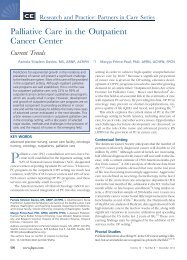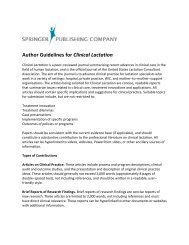social work practice and the law - Springer Publishing
social work practice and the law - Springer Publishing
social work practice and the law - Springer Publishing
You also want an ePaper? Increase the reach of your titles
YUMPU automatically turns print PDFs into web optimized ePapers that Google loves.
12 Social Work Practice <strong>and</strong> <strong>the</strong> Law<br />
to help close <strong>the</strong> “justice gap” (Legal Services Corporation, 2009; Legal Services<br />
NY, 2009). O<strong>the</strong>r professional groups, such as <strong>law</strong>yers, are inviting our profession<br />
to collaborate with <strong>the</strong>m in <strong>the</strong> project of giving clients access to<br />
justice <strong>and</strong> realizing <strong>the</strong> civil <strong>and</strong> human rights <strong>the</strong>y should enjoy.<br />
In this chapter, we have identified that literally millions of persons who<br />
potentially engage with <strong>social</strong> <strong>work</strong>ers are enmeshed in <strong>the</strong> legal system in<br />
some way or avoid enacting <strong>the</strong> legal rights <strong>and</strong> benefits that <strong>the</strong>y are entitled<br />
to. We have also established that <strong>the</strong>re exists documented evidence of discrimination,<br />
oppression, <strong>and</strong> unequal access to justice based on race <strong>and</strong> class. It is<br />
clear from <strong>the</strong> NASW Code of Ethics that we have a moral <strong>and</strong> ethical obligation<br />
to address this <strong>social</strong> injustice. The Preamble to our Code clearly<br />
states that <strong>the</strong> primary mission of <strong>the</strong> <strong>social</strong> <strong>work</strong> profession “is to enhance<br />
human wellbeing <strong>and</strong> help meet <strong>the</strong> basic human needs of all people, with particular<br />
attention to <strong>the</strong> needs <strong>and</strong> empowerment of people who are vulnerable,<br />
oppressed, <strong>and</strong> living in poverty” (NASW, 1999, p. 1). The Code provides<br />
fur<strong>the</strong>r instruction that <strong>social</strong> <strong>work</strong>ers must address discrimination: “Social<br />
<strong>work</strong>ers should act to prevent <strong>and</strong> eliminate domination of, exploitation of,<br />
<strong>and</strong> discrimination against any person, group, or class" (NASW, 1999,<br />
Section 6.04). We as <strong>social</strong> <strong>work</strong>ers have been invited to engage with <strong>the</strong><br />
legal system <strong>and</strong> legal professionals to participate in initiatives that advance<br />
<strong>the</strong> goal of achieving <strong>social</strong> justice. Our ethical m<strong>and</strong>ate is clear. The question<br />
<strong>the</strong>n becomes what are some of <strong>the</strong> reasons <strong>and</strong> barriers that can explain <strong>the</strong><br />
<strong>social</strong> <strong>work</strong> profession’s reluctance to engage with <strong>the</strong> <strong>law</strong>?<br />
Various <strong>social</strong> <strong>work</strong> commentators have identified <strong>the</strong> contradictory, yet<br />
complementary relationship of <strong>social</strong> <strong>work</strong> <strong>and</strong> <strong>the</strong> <strong>law</strong> (Healy, 2009; Madden,<br />
2000; Weiss-Gal & Gal, 2009). The impact of <strong>the</strong> legal system on <strong>the</strong> lives of<br />
clients has greatly exp<strong>and</strong>ed in recent years <strong>and</strong> because of this trend, <strong>the</strong><br />
U.S. legal system is an arena where many <strong>social</strong> <strong>work</strong> client issues are sorted<br />
out, competing interests are addressed, <strong>and</strong> policy decisions have been<br />
made, yet some authors suggest that little has been done by <strong>the</strong> profession<br />
to address <strong>the</strong> problems within <strong>the</strong> justice system (Madden, 2000; Mitchell &<br />
Lynch, 2003; Reamer, 2004; van Wormer, 2009).<br />
Currently, <strong>the</strong> perception of some <strong>social</strong> <strong>work</strong> commentators is that<br />
despite <strong>the</strong> enormous impact <strong>and</strong> control <strong>the</strong> legal system has on <strong>social</strong><br />
<strong>work</strong> <strong>practice</strong>, <strong>the</strong> profession acts more often as passive collaborators (ra<strong>the</strong>r<br />
than aggressive advocates) when it comes to <strong>the</strong> <strong>law</strong> <strong>and</strong> that <strong>social</strong> <strong>work</strong>ers<br />
more often take on <strong>the</strong> role of enforcing existing statutes ra<strong>the</strong>r than recognizing<br />
<strong>the</strong> inadequacies <strong>and</strong> injustices within <strong>the</strong> legal system <strong>and</strong> acting to<br />
change <strong>the</strong>m (Madden, 2000; Mitchell & Lynch, 2003). Social <strong>work</strong>ers have<br />
been reluctant to study <strong>the</strong> basis of <strong>the</strong> <strong>law</strong> as it relates to <strong>the</strong>ir <strong>work</strong> or to<br />
think of it as a tool that can advance <strong>the</strong> achievement of <strong>the</strong>ir objectives in<br />
<strong>work</strong>ing with clients (Doron, Karpel, & Or-Chen, 2010).<br />
Healy (2009) explores <strong>the</strong> possible reasons for what she identifies as <strong>the</strong><br />
<strong>social</strong> <strong>work</strong> profession’s lack of visibility in <strong>the</strong> human rights movement.<br />
The author suggests that a focus on needs ra<strong>the</strong>r than rights <strong>and</strong> on <strong>social</strong><br />
<strong>and</strong> economic rights ra<strong>the</strong>r than civil <strong>and</strong> political rights can offer some explanation.<br />
It is fur<strong>the</strong>r advanced that in <strong>social</strong> <strong>work</strong> discourse, needs <strong>and</strong> rights<br />
are often placed in opposition, as if promoting one presents a conflict <strong>and</strong> is
















